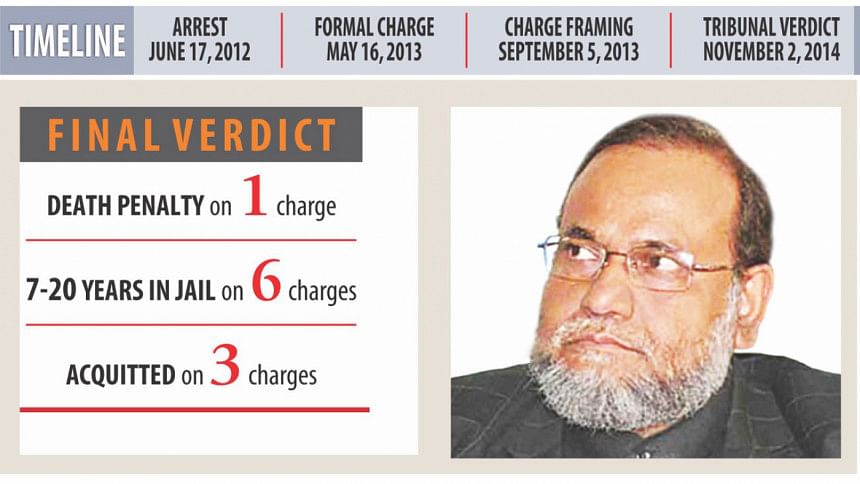DEATH stays for Jamaat’s MONEYMAN

He was “an indispensable cog in the murdering machinery” installed at Mahamaya Dalim Hotel in Chittagong during the 1971 Liberation War.
His militiamen picked up freedom fighters and pro-liberation people from different parts of Chittagong and held them captive at the hotel, which he had transformed into an Al-Badr camp.
His men brutally tortured the detainees and killed many of them, turning the camp into a "death factory". The bodies of the victims were then dumped into the Karnaphuli river.
The mastermind behind it all is Mir Quasem Ali, the chief of Chittagong Al-Badr, an infamous auxiliary force of the Pakistan army.
More than four decades after committing the atrocities, Quasem faced justice. In November 2014, a special tribunal handed him the death penalty for the crimes against humanity.
Profile of Mir Quasem
And yesterday, a Supreme Court bench unanimously upheld his death penalty, paving the way for his execution.
Quasem, 63, is the fifth Jamaat-e-Islami leader to get the death penalty for notorious role in 1971. He is considered by many as the main financier of the anti-liberation party.
He now has the option of seeking review of the SC judgment after the release of full text of the verdict. If his review petition is rejected, he will get a chance to seek presidential clemency.
If Quasem decides not to seek clemency or is denied it, he will be the fourth Al-Badr top leader to walk the gallows.
Quasem, a member of Jamaat's central executive council, had allegedly paid $25 million to an American lobbyist firm to carry out a smear campaign to make the war crimes trial controversial, the then law minister Shafique Ahmed told parliament on April 28 in 2013.
The International Crimes Tribunal-2 gave him death penalty on two charges and different jail terms on eight other charges. He later challenged the verdict at the apex court.
It its verdict, the tribunal observed, “The AB [Al-Badr] members being actively commanded, effectively administered and consciously guided by accused Mir Quasem Ali used to confine those whom they defined as 'miscreants' [freedom fighters] and political or ideological opponents. The accused was thus an indispensable cog in the 'murdering machinery' implanted at Dalim Hotel.”
According to the prosecution, Quasem, until November 6, 1971, was president of Chittagong town unit of Islami Chhatra Sangha, the then student wing of the Jamaat-e-Islami.
He was made general secretary of East Pakistan Chhatra Sangha on November 6, 1971. He became one of the top leaders of Al-Badr, which was formed with the leaders and activists of Islami Chhatra Sangha.
He went into hiding after the Pakistan occupation forces and their local collaborators surrendered on December 16, 1971. But after the changeover in 1975, he re-emerged and subsequently established himself as a top businessman in Bangladesh.
He was arrested on June 17, 2012, at the office of the daily Naya Diganta, a concern of Diganta Media Corporation, of which he was chairman.

The SC yesterday upheld his death sentence on one charge -- the killing of young freedom fighter Jasim Uddin at Dalim Hotel -- and jail terms on six other charges over his involvement in abduction, confinement and torture of freedom fighters and innocent people.
It, however, acquitted him of the other three charges, including a murder charge for which he was sentenced to death by the ICT-2.
During the appeal hearing last month, the SC bench led by the chief justice raised questions about the performance of the investigators and prosecutors.
Early this month, two ministers came down hard on the chief justice for his comments on the prosecution and investigation teams. One of them even said Quasem's appeal should be reheard by a reconstituted bench, keeping the chief justice out of it.
The statements of the two ministers led to speculations about what the verdict would be.
But dispelling all confusion, the five-member SC bench, headed by Chief Justice Surendra Kumar Sinha, delivered the short verdict in a packed courtroom at 9:42am amid tight security.
The other four judges are Justice Syed Mahmud Hossain, Justice Hasan Foez Siddique, Justice Mirza Hussain Haider and Justice Mohammad Bazlur Rahman.
The apex court pronounced the verdict around 40 minutes after the scheduled time, as court officials mistakenly didn't put Quasem's appeal at the top of yesterday's supplementary cause list.
The chief justice reprimanded the officials for the mistake.
Later, the SC delivered the verdict after the appeal was included in the cause list.
Justice seekers, war crimes campaigners and the prosecution were happy with the verdict. People from different walks of life brought out processions and distributed sweetmeats in Chittagong and the capital as well as other parts of the country.
Upset at the verdict, Jamaat called a nationwide dawn-to-dusk hartal for today, protesting “the government's conspiracy to kill Quasem through false cases against him”.
The convict, who is in the condemned cell of Kashimpur Jail-2 in Gazipur, was informed about the SC verdict. He looked normal, Senior Jail Superintendent of the prison Prasanta Kumar Banik told The Daily Star.
NEXT STEPS
The process of executing Quasem would start after the full verdict is released, Attorney General Mahbubey Alam told this newspaper.
But it will be halted if Quasem files a review petition, and he has to do it within 15 days from the date of the verdict's release, said Mahbubey.
Usually, a review appeal is entertained for consideration in case of serious factual mistakes in the verdict or wrongful application of the law, said the chief law officer of the state.
Earlier, five convicts -- Jamaat leaders Abdul Quader Mollah, Muhammad Kamaruzzaman, Delawar Hossain Sayedee and Ali Ahsan Mohammad Mojaheed and BNP leader Salauddin Quader Chowdhury -- filed review petitions after the release of full verdicts.
Of them, Quader Mollah, Kamaruzzaman, Mojaheed and Salauddin were executed after their review petitions were rejected.
A review petition of Sayedee, whose death sentence was commuted to jail until death by the SC, is now pending with the SC.
The apex court on January 6 this year upheld the death sentence of Jamaat Ameer Motiur Rahman Nizami for war crimes, but the full verdict is yet to be released.
Yesterday, the attorney general expressed satisfaction over the SC judgment. “We have got the desired verdict," he told reporters at his office.
Law Minister Anisul Huq was also happy with the SC judgment.
“If Mir Quasem Ali does not file a review petition, the SC verdict will be executed,” he told The Daily Star.
Coordinator of ICT's Investigation Agency Abdul Hannan Khan and its Co-coordinator Sanaul Huq, and ICT Prosecutor Tureen Afroz were also satisfied with the verdict.
Meanwhile, Quasem's principal lawyer Khandker Mahbub Hossain said history would judge the verdict that upheld the death penalty of his client.
"As a lawyer, I have to accept this verdict,” he told journalists at his office.
Mahbub said they would decide on filing a review petition with the SC after receiving the full verdict.
Quasem's family claimed that the Jamaat leader was convicted on "weak evidence and deposition" in the war crimes case.
"It has been proved through the chief justice's comments at the appeal hearing in the war crimes case,” Quasem's wife Khondker Ayesa Khatoon said in an email to The Daily Star.
"Therefore, there is no legal basis for upholding the death penalty for him,” she added.
Appeals of 10 war crimes convicts are now pending with the top court. The convicts include Jamaat leaders ATM Azharul Islam and Abdus Subhan, expelled Awami League leader in Brahmanbaria Mobarak Hossain, state minister of the HM Ershad-led government Syed Mohammad Qaisar.
Besides, the government filed an appeal, seeking death penalty for former Jatiya Party lawmaker Abdul Jabbar, who was sentenced to imprisonment until death by the ICT-1.

 For all latest news, follow The Daily Star's Google News channel.
For all latest news, follow The Daily Star's Google News channel. 




Comments